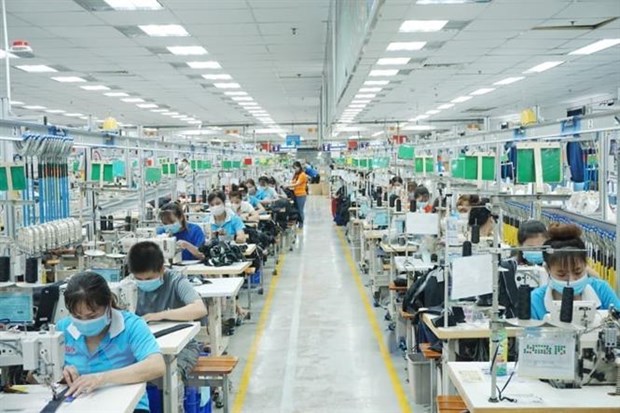
HCM CITY — Building stable labour supply chains with labourers put at the centre of all policies and emphasis laid on ensuring income and social security is one of the solutions to post-pandemic economic recovery, heard a seminar in the framework of the 4th Việt Nam Economic Forum held in HCM City on Sunday.
Deputy Minister of Labour, Invalids and Social Affairs Lê Văn Thanh said the pandemic has left negative effects on the labour market and labourers’ jobs and incomes.
Supply decreased sharply while the number of labourers with jobs dropped to the lowest level for many years. The number of labourers with jobs stood at 49.07 million in the fourth quarter of 2021, down 1.79 million from one year ago.
The unemployment rate peaked in Q3 of 2021 at 3.98 per cent, equivalent to over 1.7 million people. The rate in urban areas reached a record 5.54 per cent in the same quarter.
The average monthly income of labourers dropped from VNĐ6.7 million in 2019 to VNĐ5.3 million in 2021.
In particular, there has been a reverse trend in the labour structure, with 1.3 million labourers moving from urban areas to rural areas and from big economic hubs to localities.
The deputy minister said although most sectors and fields have entered the recovery period and begun to record growth again, labour supply remains limited, unable to meet demand, especially the demand for skilled personnel.
Some localities and industries are facing a labour shortage, particularly textile-garment, electronic assembling, wood processing, and tourism and education.
Vice-chairman of the Vietnam General Confederation of Labour Ngọ Duy Hiểu underlined the need to create a favourable environment for the labour market to recover and develop, calling for early reform of policies on wage, social security, and social housing.
He also suggested reforming policies on investment attraction to prevent the concentration of too many investment projects in a locality, which puts pressure on the local infrastructure while causing a local labour shortage.
Meanwhile, Ingrid Christensen, director of the International Labour Organisation (ILO) in Việt Nam said that after the pandemic, the clear and comprehensive solution to recovery is based on the four fundamental pillars of economic and employment growth, protection for all workers, global social security, and social dialogue.
The good news is that Việt Nam is on the right track in implementing these four pillars simultaneously, she added.
Việt Nam has achieved remarkable results in modernising labour laws, expanding the scope of social security, and improving the database of the labour market. The country has also been making effort to enhance the workforce skills to better fit the evolving labour market in a transforming economy.
Employment and the fundamental rights to work is one of the key instruments through which individuals can be integrated into society, and contribute to its development. In this regard, comprehensive and effective employment, along with freedom of choice are among the key strategic goals for the country’s 2030 and 2045 agendas.
Dr Makiko Matsumoto, employment specialist at the ILO office in Bangkok, Thailand added that the recovery of the labour market should be people-centric. In specific, it is necessary to increase the workers’ capacity, strengthen institutions, and promote inclusive economic growth as well as adequate, sustainable work for all.
Vice chairman of HCM City People’s Committee Dương Anh Đức shared the city’s experience in keeping labourers. He said taking care of labourers’ life, both material and spiritual, during the pandemic has helped workers stay with their employers, allowing enterprises to quickly resume operation and avoid disruption in labour supply. — VNS
- Reduce Hair Loss with PURA D’OR Gold Label Shampoo
- Castor Oil Has Made a “Huge” Difference With Hair and Brow Growth
- Excessive hair loss in men: Signs of illness that cannot be subjective
- Dịch Vụ SEO Website ở Los Angeles, CA: đưa trang web doanh nghiệp bạn lên top Google
- Nails Salon Sierra Madre
 VnExpress News The News Gateway of Vietnam
VnExpress News The News Gateway of Vietnam




